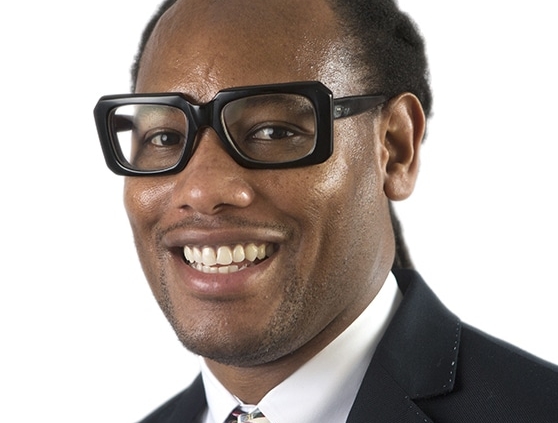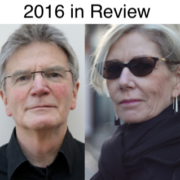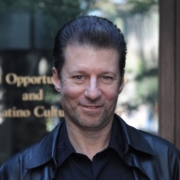Tunisia is known for sparking what many in the West call the Arab Spring, the revolutionary protests that swept across North Africa and the Middle East starting in 2010.
My guest today is Tavis Jules. Together with Teresa Barton, he co-authored a new book entitled
Educational Transitions in post-revolutionary spaces: Islam, security, and social movements in Tunisia. He argues that the Tunisian revolution had everything to do with education.
In our conversation, we discuss the history leading up to the 2010 protests that would peacefully toppled the president as well as the fallout 7 years later.
Tavis Jules is an Associate Professor of Cultural and Educational Policy Studies at Loyola University Chicago.
Citation: Jules, Tavis, interview with Will Brehm, FreshEd, 111, podcast audio, April 9, 2018. https://www.freshedpodcast.com/tavisdjules/
Translation, Transcript, and Resource:
Will Brehm 1:18
Tavis Jules, welcome back to FreshEd.
Tavis Jules 1:20
Thank you. Great to be back again, Will.
Will Brehm 1:23
So, the “Arab Spring” was a series of revolutionary protests that spread throughout North Africa and the Middle East in 2010 and onwards. Can you tell me how they started? Can you remind listeners how they started?
Tavis Jules 1:38
Of course, that’s an excellent question to begin with. First and foremost, one of the misnomers that we have in the West is we’ve labeled the ongoing uprising across the North Africa and Middle Eastern region. In fact, many Tunisians don’t think of the so-called “Arab Spring”, which is a very Western label as a sort of spring of revolution. Many across the region just sort of felt that the time had come for some sort of uprising to happen. And I think many of the influential factors had to do with they were very much sort of tired with Western influence across the region. Western influence looked very different in very different countries. One of the arguments that the book makes is that in Tunisia, it has had this really interesting social contract with despots, dictators, bays, and kings, where it would ultimately allow them to govern over extended periods of time once they sort of protect their social freedoms. They provided a decent livelihood, and more importantly, they provide access to education -and I’ll explain this a little more in detail as we go along- but ultimately, what happened in 2010, it was sort of “the last straw that broke the camel’s back” in the Tunisian context because before 2010, Tunisians were sort of rising up against the so-called benevolent dictator, Ben Ali. But what makes 2010 different and ultimately, what led to the spreading of it across the Middle East and North Africa, was, I think, the aid of social media. And many people sort of have written about the aid of social media in the revolution and what I ultimately tried to do across the book with my co-author is that we sort of look at how in 2000, when Ben Ali first introduced social media into education, it was introduced as a tool towards engendering economic development and growth because of the high unemployment rate that existed in the country at that time. Ultimately, by 2010, social media would then backfire against the Ben Ali regime, and it would sort of create a leaderless revolution that would sweep across North Africa and the Middle East. And so many Tunisians actually argue that the so-called revolution -and Tunisians refer to it as an uprising or Ottawain Arabic- they talk about the Tunisian uprising as actually starting in 2008 in the Gafsa region within Tunisia. And ultimately that revolution was unsuccessful because it was quenched by the ruling elites at that point in time, but it was also not sanctioned by the ruling elites at that point in time. But by 2010, with the self-immolation of Mohamed Bouazizi, what ultimately happened that is the protests were moving immensely from the interior region along the elite coastal region, and ultimately, into Tunis. At that point in time, the elites’ sort of stepped back and allowed the educated masses to sort of take their concerns directly to the leader. The uprising was, one, it was led by a sort of a middle-class educated elite, but it was also sanctioned by the elites. And before Bouazizi’s self-immolation in 2010, there had been numerous self-immolations that had occurred across that year. So, you had this sum of self-immolations in Tunisia but no one in the Western world sort of paid attention and sort of was even interested in what was going on. And so, Tunisian’s argue this was sort of coming. The rest of the world sort of took it as well, you know, this was a unique starting point.
Will Brehm 5:43
So, let me ask a little bit about this self-immolation. I mean, there was a series of them before Mohamed Bouazizi. But can you tell me a little about Mohamed Bouazizi? Who was he? And how did he get to the point of self-immolation?
Tavis Jules 6:00
Sure. So Bouazizi was just an ordinary vendor living in the hinterland regions of Tunisia. It’s interesting because he was not well-educated per se. But he, like many Tunisians, sort of ascribed towards getting to this notion of what in the book we refer to as “middle classness”. And I think what had happened with Bouazizi -he’s a food vendor- he had sort of gone through his daily routine of selling fruits on the street. And numerous times over the course of the past year, this would be 2010, he had been molested by the intelligence police in Tunisia. The intelligence police during Ben Ali’s reign in 2010 at that time it numbered 700,000. citizens. And basically, what the intelligence police did is that they collected information on citizens. And so, he’d been hassled by the intelligence police, he’d been hassled by the regular police. And you know, he was just, “You know, what, I’m just trying to make a living, you know, I’m already having trouble providing for my family”. And ultimately, what had happened is that I think on that morning, you know, it was just an ordinary morning for him and a female police officer assaulted him twice. As she was standing in front of his car, telling him you know, “You don’t have the necessary permits, etc., you need to move on, you can stand here, etc.”. And I think it was so trying because already during that week he’d experienced several sort of assaults -verbal assaults and abuse from the police at that point in time- that this was really the last and he was like, “You know what, I’m sort of tired of the graft and the corruption that was going on”. And you know, his self-immolation was to say you know, “You’ve taken everything from me, why don’t you just take the last thing”. And basically, what he did is he went to the resident general’s house and in front of the police station he sort of threw gasoline on himself and set himself on fire in protest of what he saw as the inhumane treatment of ordinary Tunisians trying to make a living. And that’s because what they had felt, and many Tunisians still feel this is that, you know, the system had become so corrupted, it become corrupt to the extent that you were able to pay for seats in education in the best schools. So, everybody wanted to achieve middle classness and education was the only way to become part of the middle-class elite. And in order for you to do that you had to bribe some official to get there. And so, the interesting caveat to the Bouazizi story is that, you know, after he died, his family just before Ben Ali fled in January 2011. The family sort of paid off Bouazizi’s family. And one of the first things that they did is that they moved to one of the most wealthiest suburbs in Tunisia, the suburbs of La Marsa, and they bought this palatial villa, and they lived in there.
Will Brehm 8:55
So, they reached middle classness, because of Bouazizi’s self-immolation.
Tavis Jules 9:01
They did. They honestly did. And for them that was sort of it. And Tunisians don’t look at them and sort of despise them, etc. You know, they feel that it was paid for what it is. But unlike the others who had self-immolated themselves before Bouazizi, they didn’t get that opportunity because oftentimes those things were sort of suppressed. And the passion that Bouazizi did it -and this is also where education became linked to the uprising- is that many argue that one of the reasons that the uprising was sort of allowed to move is because the first people who were responding to Bouazizi’s self-immolation were a group of members from the local teacher’s union. And it’s those teachers who ultimately started taking pictures and they’re the ones who started getting the words out on social media, etc. So, one can argue that the teachers had not been there, that we perhaps might have not have had the start of the revolution that took the Middle East by storm.
Will Brehm 9:59
Why? Why were the teachers there? Why was the teacher union so involved in the demonstration that happened after Bouazizi set himself on fire?
Tavis Jules 10:07
They were there by coincidence. The self-immolation happened just outside the local teachers trade union. And so, it was just by happenstance that they happened to be there. And they sort of took it up, because at that point in time, what it ultimately had happened. And this is very similar to the “Gucci Grace and Mugabe” story. Is that ultimately what had happened by that point in time is the Ben Ali’s, second wife, Leila Trabelsi and her brothers, they had sort of raped the country of everything possible. Many Tunisian’s say, we were fine with Ben Ali’s corruption, but we couldn’t stand the corruption of his wife. And ultimately, what many people started understanding is that the more that they were taking, it was just going into the hands of a selected four or five people. And so, I think by that point in time, teachers became so frustrated here, and I’m speculating, that they were like, you know, what, here’s another innocent under-educated soul trying to prove a point. Because for them, you know, proving a point is not a drastic extreme as self-immolation but something through protest or something like that. And here they were, well, you know, we can’t do anything. And as I said, before, you know, what ultimately made this difference is that even when the teachers rose up with the teacher’s union, and then linked to the other big labor unions across the country, the coastal elites who would often sort of not sanction those things or would block their way towards marching into Tunis, they didn’t do anything. Social media played such an important role that as the wave of protests and demonstrations started hitting the wealthy towns of Sfax, Sousse, Monastir, Hammamet, etc., they just let them pass. And I think for us, after sort of reading that narrative, which was one that very well explained, within the Western media, that’s partly why we got interested in sort of understanding the role that education has played in the revolution. And as we started doing the research, we also found that Tunisia is unique -and hence we talked about this idea of Tunisian exceptionalism- that Tunisia is unique over the course of its 3,000 years of history, ultimately, what it has done is that during conquest, looting, plunder, you know, dictator, what they ultimately do is that every so often, they agree upon a sort of things that a dictator can get away with, in the form of the social contract. And when they don’t like what the dictator is doing, they sort of rebelled against that dictator. And the way in which the they rebel is that often its education is used for a tool of rebellion against a dictator. It’s exactly the way in which the educated elites rebelled against the French. It’s the way in which Ben Ali rebelled against sort of Bourguiba in the silent coup and so forth. It’s this continuous history of rebellion.
Will Brehm 13:15
So, this cycle of rebellion, obviously, there’s a history to it, as you’re saying. So, what in this cycle, in 2010, 2011, what were the protesters -those who were demonstrating against Ben Ali- what were they actually asking for? Like, what did they want? Why was the social contract, in a sense, broken with Ben Ali? And what were they proposing as the sort of solution to it?
Tavis Jules 13:45
That’s a great question. At the end of the day, as I mentioned earlier, the protesters -Tunisians were fine with some level of graft and corruption. They had just argued that the corruption had sort of gotten too out of hand. And the basic reasoning for that is that basically what had happened is that things continued to be subsidized, such as, you know, bread, oil, flour, and so forth but the cost of living was increasing. But more importantly, what Ben Ali had managed to do in taking power in 1987, he had sort of enacted this band-aid solution where he had tinkered with the educational system. And in tinkering with the educational system, what he then did is that initially before he did that tinkering, when students wrote their baccalaureate exam, which is the end of secondary school exam that ultimately send them into university, as a way to appease the populace at that point in time and to get elected, he did it in such way as where he said, “Okay, 25% of the baccalaureate grade can come towards existing coursework and said that the exam only counts towards 75%. When he did that, what he didn’t realize intentionally that he was doing is that he was moving hundreds of thousands of students who would not have gotten great grades at the baccalaureate into the higher education system. As he moved them into higher education what that also then meant is that the higher education system ultimately became overburdened, and then he went on this expansion and building boom of universities. So, today Tunisia has 13 public universities, which are considered the best universities because they are government subsidized all the way -it’s free to Tunisians all the way. And then what he then insisted of doing is that once students were at university, he sort of insisted that they stayed at university and studying as a way to sort of allowing them not to enter the job market because there weren’t enough jobs there. So, then you had the student went from a bachelor’s and master’s to their first PhD to the second PhD. And so, students would have been studying and so you have all these elite students, and later on, I’m happy to talk about the link to education and the Islamic State because there’s a relevance of interesting correlation, we found there. So, but then what you had is that you had all these students who were sort of remaining in Tunisia’s educational system, and they were simply buying time -we argue- as Ben Ali was hoping that his new wave of modernization reforms would sort of come on stream and then ultimately create employment. What happened is that everything that he tried to invest -in terms of diversifying the economy and rejecting the economy to allow for more Tunisians to have access to a better technologically-driven economy. Those reforms never sort of materialized the type of jobs that would ultimately happened. And that was it is that at that point in time, by 2010, you had too many over-educated Tunisians, who had by all indicators defined in the social contract had amassed middle classness, but they were unemployed. And then you had another group who were employed but under-employed. And then you had a third group who were employed but feel as though that they were paying too much for corruption. I think those three factors ultimately coalesced into this leaderless revolution that brought everybody from the poor, to judges, to lawyers, to doctors onto the street. And so, it was this massive wave of change and ultimately what had happened is that unlike the 2008, Gafsa uprising, nobody was there to suppress it. Whereas in the past, suppression had been a very good tool. And this is also the role that social media ultimately played because in 2000, when Ben Ali sort of went on this campaign to have Tunisians become the forefront of technological innovation, one of the things that his regime did -which was, I think to the best of my knowledge, one of the only regimes in the world that did it- is that he went on this idea of every Tunisian had a computer in their house and he provided government grants so that every Tunisian can sort of have that computer in there. And so, one of the things we argue is that this move towards technological innovation. At 2000 ultimately, would sort of create tools across social media that would, unlike Libya, not allow the regime to suppress. And so, what had happened by 2010, is that the Ben Ali regime was doing a very good job at suppressing all other forms of communication. So, radio, television, but they had not figured out how to suppress the internet yet. And so many factors sort of coalesced. But again, it was only the educated middle class that also understand and knew how to use the internet to their advantage.
Will Brehm 18:59
So, Ben Ali sounds like he created the conditions that eventually overthrew him -that created the conditions for his own downfall, his own demise. So, it’s been seven years since Ben Ali was overthrown peacefully in Tunisia. What has happened? Has there been a new social contract that has been created that has given this over-educated population more jobs? What has happened in these seven years?
Tavis Jules 19:27
Absolutely nothing has happened in the past seven years. Tunisia’s educational system has gone through -and for the use of a better word, you know, we refer to it as beyond a gradualist education reform. And so immediately after the uprising, there are all these little tinkerings to the system that occurred. One of the first ones that happened is that university deans and rectors were no longer appointed. They were voted among and between themselves per se, so that’s sort of what happened. But then sort of beyond that, it wasn’t until late 2016, parts of 2017, that the big reforms started entering the arena. But these entered the arena in the sense of social dialogues. The justification for incremental reforms had much more to do with the idea that we need to fix the Tunisian constitution first. And we need to ensure that we have all our freedoms and our rights first, and then we can sort of get to education. So, it’s interesting, because education was ultimately the triggering mechanism for the uprising, but it’s literally the last thing to had any sort of tinkering with and everybody sort of agree wholeheartedly that Tunisia’s education system is broken to the extent that the labor market requirements that companies require are not being taught across its school system -and that is at the primary, secondary, and tertiary level. So, companies are complaining that the people who they are employing don’t have the necessary skills. Whether you call them 21st century skills, or you call them skills for the knowledge-based economy, they don’t have these basic skills needed to work in their industries and so they refuse to hire them. So, there’s a complete disparity between what is being taught in school and what companies need. But now for the past seven years, much of the conversation has still been on different forms of reform but nothing to do with education. Because again, everybody just thinks that the education system is good. But when you talk to people in the system, you talk to the amount of students who are still under-employed or unemployed, they’re like, “We can’t find jobs”. So, there’s a huge mismatch between skills needed and what is taught.
Will Brehm 21:59
So many it wasn’t Ben Ali’s fault at all right? I mean, it could just be an issue of global capitalism. What skills are needed where and when?
Tavis Jules 22:07
That is true because in the immediate post-revolutionary period, Tunisians went complete to the opposite side of the pendulum when they sort of adopted a very Islamist party and you thought that Tunisia would sort of move away from democracy and move towards a much more newer version of Islam fundamentalism. That didn’t happen because the party sort of was kicked out of power again through to unrest and protests. So, you know, that social contract was broken very quickly. And then later on Tunisians opted to put into power a president who was part of the old Ben Ali regime. Many argue and speculate that what ultimately is happening -I’m hearing this in my interviews, and I’m hearing young people say this, as you know, as we go back- is that things were better under Ben Ali if he didn’t marry again. So, they blame the wife for everything that has gone wrong and so now many people sort of missed the benevolent dictator because what they’re saying is that, “At least prices didn’t increase, and at least this didn’t happen, and that didn’t happen, but you know, we were sort of better off”. And it’s interesting, the things that they then start equating to how good things were under Ben Ali. One of the most important things is the environment. You know, under Ben Ali, the streets were akin to those in Singapore, you know, they were spotless. Now, you see the proliferation of garbage and you also see other mental and social health issues that were often hidden under Ben Ali that are sort of coming to the front. You’re seeing children begging on the street, you’re seeing old people begging on the street and so forth. So, you see all these things that the West has been having to deal with and Ben Ali had done a really good job at hiding. As these things start appearing in society, many people are starting to long for the 20 plus years of Ben Ali’s dictatorship and saying, “At least things were better”.
Will Brehm 24:08
One of the fascinating things that has happened in that part of the world, starting in 2014 if I’m not mistaken, is the rise of the Islamic State. What impact has the Islamic State had on Tunisia?
Tavis Jules 24:22
That is an excellent question. When we were writing this book and up until last year when the numbers were revised that showed that Ukraine had the most foreign fighters in Islamic State. Tunisians dominated the leadership in Islamic State as well as the fighters. So, we argued that Tunisians play a special role in Islamic State because of numerous factors. One: Tunisians are a Sunni population and Islamic State is sort of based on this idea of promulgating a Sunni form of Islam. Two: you had a significant amount of over-educated Tunisians that Islamic State were able to recruit and entice with a very set of distinctive rewards. And many of the Tunisians recruited to the higher echelons of power within Islamic State had a PhD degree, or at least had a master’s or higher. Many of them went into the communications sector of the Islamic State and because they were so highly educated, the Tunisians, they were not the foot soldiers of Islamic State. They took up leadership at the top echelons as I mentioned before. And in taking up leadership, what Islamic State was able to do is that they put together the most amazing recruitment package we offer. Is that here you have somebody who would go from making next to nothing as a salary with a PhD -roughly about, you know, 800 dinars, which translates to about maybe $350 a month- going to Islamic State and sort of making a minimum of 4,000 – 5,000 US dollars per month. In addition to making a stat salary, they get a signing bonus, and they’re provided with free house. The Tunisian men were provided with sex slaves, and they were provided with comfortable work environment. And more importantly, the children got free access to the best schools that Islamic State had to offer. How can anybody sort of beat that? You go from making $350 a month to 4,5,6,7,8, $9,000 a month, and you don’t have to pay for anything at all. And all you’re sort of doing is working. And so many Tunisians, we argue, sort of use that as a way to join Islamic State. And for Tunisians joining Islamic State, it wasn’t about an ideological backing, it was very much more one based on financial means and the idea to sort of get out of their existing situation and put their degrees to use. And so, we make the argument that ultimately Tunisia turned into a hotbed of jihadist recruitment for Islamic State. And so again, it had much to do with the foundation of the Sunni recruiting Sunni, and the idea that you had a labor market and labor mobility that was sort of welcome. And so, across Tunis you had in especially the remote towns you had, overnight, the example of Bizerte overnight, you had 100 men deserted from the coastal city of Bizerte. They all just sort of pick up overnight and they all just went Islamic State. It’s called the night of the missing men.
Will Brehm 27:34
It sounds like the Islamic State basically fulfilled the economic need that many Tunisians -Tunisian youth particularly- were seeking and were trying to get after or during the Tunisian revolution starting in 2010. So, it’s like they filled that gap that had existed since 2010.
Tavis Jules 27:57
Indeed, that is correct. So, the gap that Ben Ali left, the Islamic State just sort of swooped in and fill that. And even before you had the men going to Islamic State, immediately after the uprising in 2011, you also had a lot of Tunisian women who sort of went to Syria and for them their sort of jihad was the acceptability of giving their body and being a sex slave. And these are not things that are often sort of reported in the West, because when we sort of think of what it means to be jihad, we often think of it as this sense of an ideological phenomena. And it’s based on the under-educated taking up arms. And that was very much Al Qaeda’s original recruitment strategy. With Islamic State, that recruitment strategy has ultimately changed. And they say, “You know, what we can recruit the best and the brightest in the field. We can pay them, and they can do the sort of work that we can do”. So, I would argue that Tunisia has ultimately changed the way we think about Jihad fundamentalism, and sort of the way it is now playing out in the world stage.
Will Brehm 29:12
What’s interesting to me is that your history of Tunisia shows how there’s been these different social contracts that get created under different strong men -kings, dictators, autocrats, whatever it is over the course of history- but today, since 2014 for instance, it seems as if the social contract is being constructed with the Islamic State. In a sense, the Islamic State has become the new strong man in Tunisia.
Tavis Jules 29:41
It is, and I would also say, you know, you asked me a question earlier, and I can sort of now reflect on it. You sort of asked me who is the new social contract with. Right now, I would veer to argue that the new social contract that Tunisians are sort of constructing is not with dictator per se, but it’s one based on religion. And so now there’s a huge fight between religiosity and secularism. But not religiosity and secularism in the way we think about it. Because now what has happened is that religiosity has sort of now come to play a different and defining role in what it means to be religious in Tunisia. Or what it means to be Islamic in Tunisia is not the same as the rest of the world. And so, Tunisia now straddles this interesting line, where it sort of needs to keep its secular ways that are part and parcel to the post-colonial project, and its French history. And it also is now embracing Islam fundamentalism. And so, you have sectors of the society that are sort of moving in a different direction, others that aren’t moving in that direction. The quick example is, you know, under Ben Ali, the burka and the niqab and the headscarf were ultimately banned -they were seen as symbols of repression. Yet Tunisia has the oldest constitution in the Arab world. Immediately after 2011 and up until now, we see the proliferation of headscarves. But a headscarf simply means that it’s a woman trying to find herself a husband. Whereas a woman wearing a headscarf looks down upon a woman wearing a burka, or a niqab as too overly repressive. But at the same time, on the other hand, immediately since 2011, we’ve seen a huge proliferation -last counted was over 1,000 new Quranic schools that have emerged as a way towards teaching Tunisian boys and girls rote recitation of the Quran. And these are not in the hinterland areas, but they are in the urban areas. So now, I think what has happened is that Tunisians as they try to find themselves, the social bargaining is sort of all up in the air, because they’re not sure what it is that they want to do, and therefore education now has sort of been left aside. And they’re trying to say, let’s fix all the other problems. And our arguments is, but the central problem is education, because you need to fix the educational system. Because what has ultimately happened? We now have approximately at last count this year, we now have 70 private universities that have now sort of popped up around Tunisia. We have all these international schools that are sort of coming into the landscape. And so, what it means in terms of the blending of religiosity and secularism is also changing with the arrival of new universities -these private universities. The educated demographics is changing. It’s moving again from a society that is based on homogeny to one that is now has to be based on open because you have lots of African students who are now coming to Tunisia to study and those two are causing new and different cultural dynamics and cultural ripples across the fabric of Tunisian society that they have never sort of experienced yet and so my bet would be that there are lots of numerous social contracts that are fighting for attention at the same time. Are we sort of sitting back waiting to see ultimately who will come out on top of the end of the day?
Will Brehm 33:10
Well, Tavis Jules, thank you so much for joining FreshEd again. It’s always a pleasure to talk and you’re always welcome on the show for your next book.
Tavis Jules 33:18
It was a pleasure being on the show again. Thanks, Will.
Educational transitions in Tunisia









